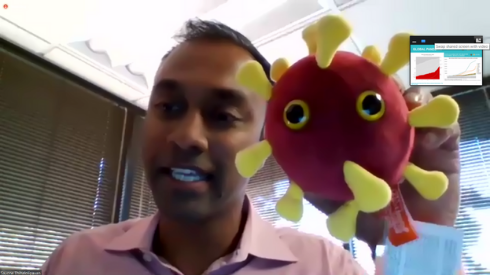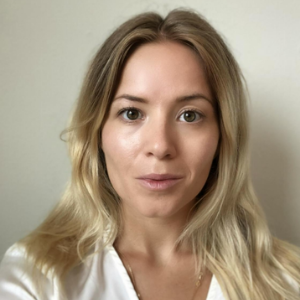City College hosts virtual panel about COVID-19 and vaccinations
The panel featured top healthcare experts taking about healthcare disparities in communities of color

Dr. Sayone Thihalolipavan presents data during the virtual panel hosted by San Diego City College on May 6. Zoom screenshot
May 7, 2021
Trusted San Diego healthcare experts joined the “Health Care Heroes: A Diverse Panel of Medical and Nursing Experts Discussing Covid-19, Healthcare Disparities in BIPOC Community Members, and Vaccines” virtual panel, hosted by the San Diego City College on Thursday, May 6.
The panelists presented statistics regarding healthcare disparities, as well as their thoughts on why it is important to get vaccinated and why there is a history of mistrust for minority populations, including trust in a COVID-19 vaccine.
The event started with a round of poll questions from the moderator, Dotti Cordell, director of the Student Health Clinic at San Diego City College.
The polls asked questions about the COVID-19 vaccinations and whether the participants have had the vaccine, as well as whether the participants think they understand herd immunity and the concept of viral mutations.
Dr. Sayone Thihalolipavan, who provides clinical and administrative services to San Diego County, noted that the County’s and the State’s goal is to fully vaccinate 75% of all people eligible for the vaccine.
“Of the goal, which is slightly over two million San Diegans, we are over 55% all the way there,” Thihalolipavan said.
He went over statistics from the county, comparing case and deaths percentages among different ages, races and ethnic groups.
“Cases are not distributed equally, deaths are not distributed equally,” Thihalolipavan said. “Non-Hispanic black males are 3 times more likely to die than white males.”
Samantha Williams, Chair of the Covid-19 Task Force with the San Diego Black News Association spoke about how they recognize the importance of focusing the efforts on vaccinating people, but also on providing education and awareness to the minority communities on how they are impacted.
Vaccine hesitancy and distrust is often connected to the history of unethical and racist treatment of Black Americans.
“We really have to understand that it is really not just about hesitancy in regard to the vaccine itself. It is very much so also connected to our historical distrust of the medical and scientific field. And that fear was earned… And we really can’t move forward and make the impact that we are looking for in terms of herd immunity, in terms of decreasing the disparities until we actually acknowledge the fears that these communities have,” Williams said.
She spoke about the Antebellum South period, sterilization program in the 1920’s and segregation in healthcare until 1964, when African Americans were turned away from most hospitals in southern states and had to travel long distances to get access to emergency care.
“Where we are in 2021 is different. We are very thankful for the progress that has been made,” she added.
Many of the panelists stressed out the importance of taking care of our mental health, especially during the ongoing pandemic. Thihalolipavan’ face mask said, “Mask your face, not the feelings.”
Dotti Cordell reminded all the students that mental health services are here for them, “this is a mental health pandemic as well.”










